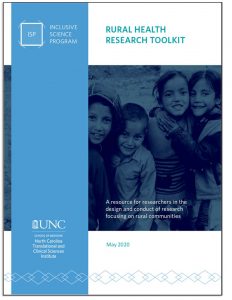The NC TraCS Inclusive Science Program (ISP) has recently launched the Rural Health Research Toolkit, a resource for researchers designing and conducting research focusing on rural communities.

ISP has created a downloadable toolkit to give researchers guidance and resources for:
- formulating research questions,
- developing protocols and recruitment/retention strategies,
- and engaging rural communities in the research process.
The document addresses underrepresentation of rural populations in research, rural health disparities, social determinants of health, ethical and regulatory issues, methodological considerations (such as study design and analytic issues), and recruitment and retention best practices.
Download the toolkit at tracs.unc.edu/services/inclusive-science-program/resources.
About ISP
The Inclusive Science Program (ISP) at NC TraCS promotes the inclusion of diverse populations across the life course in clinical and translational research, with particular emphasis placed on groups that have been historically underrepresented in research or who experience significant health disparities in North Carolina.
Our goal is to provide investigators with access to experts, resources, and educational opportunities that enhance their ability to engage diverse study populations in clinical and translational research.